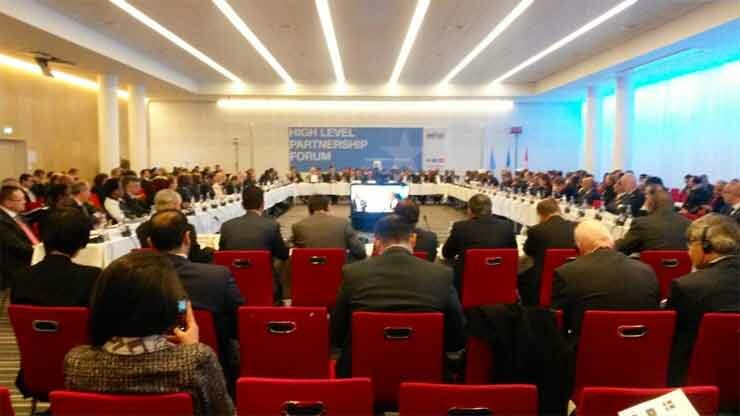Pirates and the Law
SINGAPORE — The world heaved a sigh of relief when Captain Richard Philips of the U.S. flagged ship, Maersk Alabama, was rescued by the U.S. destroyer Bainbridge. By a coincidence of history, Bainbridge was also the name of the captain of the frigate Philadelphia that was captured by the Barbary pirates in 1803 and its crew of 300 men were detained for ransom. The then U.S. president, Thomas Jefferson, refused to pay ransom. Instead, the United States led a multinational force to fight the pirates.
We call upon President Obama to emulate the example of President Jefferson and lead the world to defeat the Somali pirates and make the seas in the Gulf of Aden and Indian Ocean safe for international navigation.
In the past several months, the international community has acted in an unprecedented manner to develop new cooperative arrangements and mechanisms to combat piracy and armed robbery off the coast of Somalia and in the Gulf of Aden.
In response to a call for action by the International Maritime Organization, the U.N. Security Council has authorized states cooperating with the Transitional Federal Government of Somalia (TFG) to enter the territorial waters of Somalia and to use all necessary means to repress acts of piracy and armed robbery.
However, it is obvious that the measures taken to date are not sufficient.
As the world’s leading naval power, the United States should take the lead pursuant to these resolutions to take resolute measures to combat piracy off the coast of Somalia. However, the United States should lead, not act unilaterally. It should also ensure that its actions are in conformity with international law, including the 1982 U.N. Convention on the Law of the Sea and the resolutions of the Security Council. We recommend the following measures:
First, the United States and other states with warships in the area should review their rules of engagement when confronting pirate ships. Warships should have the authority to use lethal force against small speed boats or skiffs with high horsepower engines carrying men armed with AK-47 rifles and rocket-propelled grenade launchers as well as piracy equipment such as ladders and grappling hooks. If warships come across such boats attempting to hijack a ship, the small boats should not simply be chased off. They should be attacked and sunk.
Second, because the small speed boats and skiffs operate from larger “mother ships,†they are able to attack ships far from the coast. The mother ships are often dhows or fishing vessels which have themselves been hijacked. More steps should be taken by the U.S. Navy and its partners to locate and neutralize these “mother ships.â€
Third, the United States should consider imposing a naval blockade on the major ports which are supporting the pirate activities. Only humanitarian aid should be allowed into such ports. This will send a message to the local communities that they will pay a price for supporting the actions of the pirates. If necessary, the international community should not hesitate to attack the pirates in their land bases, which is authorized both by the UN Security Council and the Transitional Federal Government of Somalia.
Fourth, to gain support from the local communities, the United States should push for the U.N. Security Council to order all foreign fishing vessels to stay out of the exclusive economic zone of Somalia. This is important because one reason some local fishing communities support the pirates is that they believe foreign fishing vessels have been plundering their fishing resources.
Fifth, the United States and its allies should give aid and assistance to states in the region, such as Kenya, that are willing to prosecute pirates apprehended by foreign warships.
Sixth, the international community should use other relevant international conventions to combat Somali piracy. These include including the 1988 Convention for the Suppression of Unlawful Acts Against the Safety of Maritime Navigation (SUA Convention) and the 1979 International Convention Against the Taking of Hostages (Hostages Convention).
Seventh, we urge the shipping community to reconsider taking armed marshals on board.
The SUA and Hostages Conventions are potentially useful tools because they are broadly accepted. If alleged offenders are present in the territory of a state party, the state has an obligation to take them into custody and to either extradite them or prosecute them.
In conclusion, we urge President Obama and Secretary Clinton to show decisive leadership in leading the international community to defeat the Somali pirates. They will have both the law and world public opinion on their side. In the 21st century, it is unacceptable for the world’s shipping to be helpless and continue to be preyed upon by the Somali pirates.
Robert Charles Beckman is the director of the Center for International Law at the National University of Singapore. Tommy Koh is ambassador-at-large at the Ministry of Foreign Affairs of Singapore and was president of the UN Conference on the Law of the Sea from 1980 to 1982.
Comments
comments
 Calendar
Calendar



































